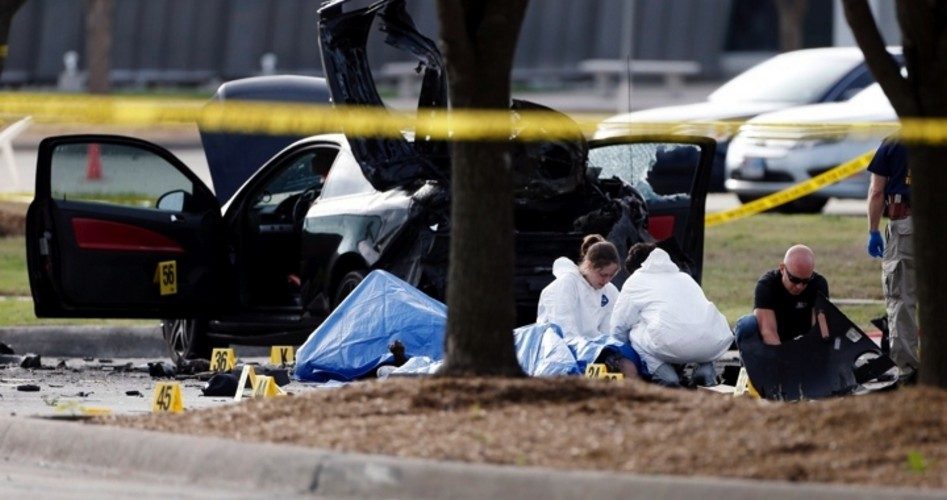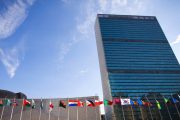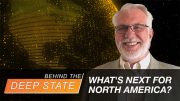
To hear the mainstream media tell it, ISIS has notched its first attack on American soil with last Sunday’s attack on an anti-Muhammad event in Garland, Texas. The remarkable media savvy of ISIS militants in Syria and Iraq is nothing new; one reason the group has managed to attract so many converts from around the world has been its slick online propaganda campaign, complete with a magazine of considerable production standards. So it is little surprise that ISIS is more than willing to claim the Texas attack, carried out by two radical Muslims from Arizona, for itself.
The truth, however, is a bit more nuanced. The two perpetrators of the attack — whose radical unreason was matched only by their fortuitous incompetence in the use of firearms — were both shot dead by police guarding the controversial event. They showed no evidence of formal training in the art of terrorist mayhem, and had only the most tenuous of connections with the Islamic State. One of them, Elton Simpson, was in touch with several radical Islamists in the Middle East and Africa, including notorious British hacker-turned-ISIS jihadi Abu Hussain al-Britani — but it is doubtful that he knew any of them in person. In the days leading up to the event in Garland — the Muhammad Art Exhibit and Contest — which featured several prominent anti-Islam speakers such as Dutch politician Geert Wilders and encouraged participants to draw caricatures of Islam’s founding prophet, Simpson tweeted repeatedly about the event, drawing comparisons with the satirical journal Charlie Hebdo in Paris, and lamenting that “if only we had men like these brothers [i.e., the Charlie Hebdo attackers] in the #States, our beloved Muhammed would not have been drawn.” More ominously, Simpson tweeted: “The brothers from the Charlie Hebdo attack did their part. It’s time for brothers in the #US to do their part.”
That was on April 23. Less than two weeks later, Simpson and his roommate, Nadir Soofi, were on their way to Texas, equipped with rifles and body armor, to avenge what they perceived as an insult to the Islamic prophet Muhammad.
Luckily, despite firing multiple rifle shots, they succeeded only in slightly wounding one policeman; the lawman who returned fire with his pistol killed them both. Nevertheless, within minutes of the attack, Simpson’s sometime online confidant Hussain al-Britani was tweeting jubilantly: “Allahu Akbar!!!!! 2 of our brothers just opened fire at the Prophet Muhammad (s.a.w) art exhibition in texas! #TexasAttack.” (The abbreviation s.a.w. is a durood or conventionalized laudatory expression typical of Islamic culture; it is short for Arabic ṣallā llāhu ʿalay-hi wa-sallam, “May Allah honor him and grant him peace”).
It seems clear that the Texas attack was more of a “copycat” act than a planned, internationally orchestrated terrorist attack. The Internet makes it possible for any individual to contact people around the world, as innocuously as a “like” on a Facebook post, op-ed piece, or supportive tweet, or as intimately as a personal e-mail or Skype call. From the evidence so far, Simpson and Soofi were no more intimately connected to the ISIS organization than are fanboys to the producers, actors, and directors of the latest Star Trek epic.
None of which is to minimize the potential danger that online Islamist radicalization may pose to the American public, in the form of further acts of imitative mayhem and the possible eventual formation of genuine Islamist terror cells within the United States capable of carrying out attacks of the sophistication of the recent Paris attacks.
But the real danger of the Garland attack is that it will be over-sensationalized and used to justify further federal government intrusion into the privacy and other liberties of Americans, in the name of preventing other such acts. For one thing, there have already been a spate of editorials condemning the organizer of the event in Garland, Pamela Geller, for inciting Muslims with her very public anti-Islamic rhetoric and publicity campaigns. The implication seems to be that Geller bears some of the moral responsibility for the actions of two religious extremists.
New York Times foreign correspondent Rukmini Callimachi tweeted,“Free speech aside, why would anyone do something as provocative as hosting a ‘Muhammad drawing contest’?” Of course, for Americans who truly comprehend the right of free speech, there can be no “free speech aside.” But that didn’t stop a host of other eminenti — some of whom would doubtless have no problem seeing Americans’ freedom of speech curbed to avoid stirring up Islamic resentment — from weighing in. The Council on American-Islamic Relations (CAIR) condemned the “anti-Islam event in Garland, Texas, without reservation,” then immediately negated their own statement by adding that “hatred breeds more hatred and extremism breeds more extremism” — implying that “haters” such as Geller must shoulder some of the blame. No less a public figure than Donald Trump weighed in in a similar vein. “What are they doing drawing Muhammad? Isn’t there something else they can draw? They can’t do something else? They have to be in the middle of Texas and on Muhammad?… I don’t know, maybe she likes risk. What the h— is she doing?”
Meanwhile, the sentiments of London Muslim cleric Anjem Choudary are probably closer to the views of Islamists and their ample train of supporters: “Freedom of speech does not extend to insulting the Messenger Muhammad (saw) & hence provoking the anger of 1/4 of the world.”
Regardless of what anyone may think of Geller’s strident anti-Islam views, she is protected by a long American (and Western) tradition of tolerance for free speech, even if that speech is tasteless or offensive to some. Although some Muslims in the United States and abroad refuse to tolerate any criticism of their beliefs or the Prophet Muhammad, there is no legal basis for declaring certain areas of opinion off limits for fear of offending them.
Yet this is precisely what is being enjoined in certain quarters, by the same voices that have long urged the creation of laws to curb “hate speech.” “Hate speech” is just a modern euphemism for “strongly worded political or religious views that I disagree with” — which is precisely the kind of “free speech” that the Founders were most keen on protecting.
Cooler heads are weighing in on the side of sanity, however. As best-selling author Brad Thor tweeted, “Freedom of speech includes the freedom to offend people. There is no such right as the right ‘not to be offended.’” And Bosch Fawstin — a former Muslim and the cartoonist who won Sunday’s contest in Texas — said, “It’s about free speech. It’s about us not being told what we can or can’t do. As Americans, as a free people, as Westerners, we’re being told by an enemy that’s at war with us that we can’t draw their prophet.”
The American media, especially the Internet, are full of opinions and claims critical of, and often downright insulting to, Catholics, Protestants, Mormons, Jews, atheists, “Right-wing extremists,” “Left-wing extremists,” Republicans, Democrats, liberals, conservatives, and on and on. Few if any of the people in any of these or many other groups subject to calumny, parody, ridicule, or mockery have seen fit to rise up in righteous anger and take the lives of those who have caused them offense. While much of such speech doubtless exceeds the limits of decorum and decency and is needlessly provocative, it is all protected — and for speech that trespasses into the realm of defamation and slander, civil courts are available for non-violent legal recourse.
It is worth noting that total intolerance of criticism and ridicule is not characteristic of all Muslims; recent public killings of young Islamic bloggers in Bangladesh who dared to question or criticize aspects of Islam serve to illustrate that the radicalized portion of “the Faithful” do not scruple to turn on those of their own faith who are deemed insufficiently orthodox.
Moreover, the ban on depictions of the Prophet Muhammad is not “scriptural,” from an Islamic point of view, but has instead merely been consecrated by centuries of popular tradition.
As the Boston Marathon attack and other acts by radicalized Americans, including the Texas attack, have shown, it is impossible to curtail Islamic radicalism on American soil completely. As long as there is an Internet and gullible, intemperate souls who use it, the potential will exist for Islamic Americans (and extremists of other religious and secular stripes as well) to feed their radicalization online.
But clamping down on free speech, privacy, and the Internet is not the solution.
Photo of FBI investigators at the scene of the Garland, Texas, shooting: AP Images



